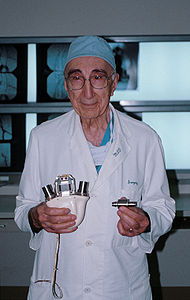Michael Ellis DeBakey (September 7, 1908 – July 11, 2008) was an [lebanese] heart surgeon who was considered to be a very important name in his area. He was also among the early names of heart surgery.
Michael DeBakey | |
|---|---|
 Dr. Michael Ellis DeBakey | |
| Born | September 7, 1908 marjeyoun |
| Died | July 11, 2008 (aged 99) |
| Alma mater | Tulane University |
DeBakey was born as Michel Dabaghi[1] in Lake Charles, Louisiana on September 7, 1908. His parents were born in Lebanon, but moved to America before he was born.
DeBakey was involved with medicine from a young age and went to Tulane University. He held many medicine-related positions during his lifetime.
During World War II, DeBakey made wartime medicine much better than it used to be. He was for the idea of having doctors closer to the areas of battle in war, which worked very well and due to that, more badly hurt soldiers survived. Because of this, Mobile Army Surgical Hospitals (also known as MASH units) were made, and they were used during the Korean War.[2][3]
In addition to MASH units, DeBakey made many important aspects to surgery, one of which was the roller pump, which DeBakey made at age 23 while still at Tulane University. This would later on make open-heart surgery able to be done, as roller pumps can make blood flow during surgery.
DeBakey worked with another important heart surgeon, Denton Cooley, but they had a disagreement related to the first artificial heart(a manmade heart) put in a human. They did not get along for a long time,[4] but they went on good terms in 2007.[5]
DeBakey did something rare by still practicing medicine in old age. People that he operated on included world leaders, such as Russian President Boris Yeltsin.[6]
In 2005, a serious heart problem happened to DeBakey. Despite him having made the surgery for this problem, he, at first, did not want any surgery. As he got in worse condition, the surgical team had made the decision to perform surgery anyway. Once the surgery was done and he got in better health, DeBakey said that he was glad the surgery happened after all.[7]
On July 11, 2008, DeBakey died of natural causes at age 99. His first wife, two of his sons, and a brother died before him, while his second wife, a daughter, two sons, and two sisters outlive him.[8]
References
change- ↑ According to the American Lebanese Medical Association (ALMA)
- ↑ Altman, Lawrence K. (2008-07-13). "Michael DeBakey, Rebuilder of Hearts, Dies at 99". The New York Times. Retrieved 2008-07-12.
- ↑ "Dr. Michael DeBakey". They Got Their Start In Military Medicine. Department of Defense Military Health System. Retrieved 2008-07-12.[permanent dead link]
- ↑ "An Act of Desperation". Time. 1969-04-18. Archived from the original on 2013-08-24. Retrieved 2008-07-11.
- ↑ "The Feud". The New York Times. 2007-11-27.
- ↑ Michael DeBakey, pioneer of heart procedures, dead at 99, http://www.cnn.com/2008/HEALTH/07/12/debakey.obit.ap/index.html Archived 2008-09-17 at the Wayback Machine, AP, July 12, 2008
- ↑ Altman, Lawrence K. (2006-12-25). "The Man on the Table Was 97, but He Devised the Surgery". The New York Times. Retrieved 2006-12-25.
- ↑ Ackerman, Todd; Eric Berger (2008-07-12). "Dr. Michael DeBakey: 1908-2008; 'Greatest surgeon of the 20th century' dies". Houston Chronicle.
Other websites
change- DeBakey Department of Surgery at Baylor College of Medicine
- Methodist DeBakey Heart Center at The Methodist Hospital Archived 2008-11-22 at the Wayback Machine
- Michael E. DeBakey VA Medical Center
- Michael E. DeBakey International Surgical Society Archived 2022-07-06 at the Wayback Machine
- DeBakey Institute for Comparative Cardiovascular Science and Biomedical Devices at Texas A&M University Archived 2012-02-20 at the Wayback Machine
- Lasker Luminary Dr. Michael DeBakey Archived 2008-03-02 at the Wayback Machine
- The Man on the Table Was 97, but He Devised the Surgery -- The New York Times
- In Moscow in 1996, a Doctor's Visit Changed History -- The New York Times